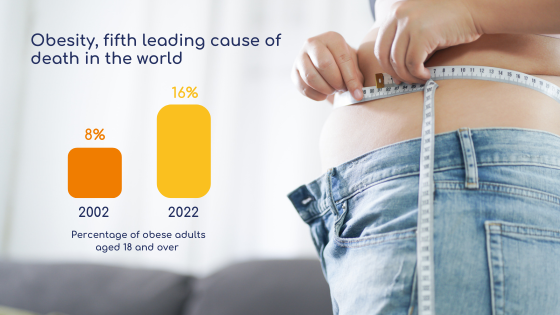
Specific nutritional needs after bariatric surgery
Bariatric surgery is performed on certain patients with a body mass index exceeding 35 kg/m². It involves a modification of the anatomy of the digestive system to reduce food intake and therefore the number of calories ingested. The main objective is to enable the patient to regain a balanced diet for better health. However, this intervention causes deficiencies that require supplementation to meet specific nutritional needs after bariatric surgery.
Bariatric surgery: a procedure for people suffering from obesity
Obesity: a deadly disease
Obesity is a chronic disease characterized by an excess of body fat, causing difficulties in everyday life. It can induce serious consequences, including the development of diabetes, high blood pressure, hypercholesterolemia, etc.1
In 2022, 16% of adults aged 18 and over were obese, twice as many as 20 years ago.2 In addition, obesity is the fifth leading cause of death in the world: alongside overweight, it is the cause of 2.8 million deaths per year.3

Why bariatric surgery is a solution proposed by healthcare professionals
Bariatric surgery, also called obesity surgery, helps patients lose weight sustainably. It is performed on people with obesity with a BMI > 35 kg/m² or on people suffering from comorbidity and having a BMI > 30 kg/m².4
There are two forms of bariatric surgery, both of which induce anatomical modifications of the digestive system.5
The first is restrictive surgery that acts on the size of the stomach. Two techniques are possible. First, surgeons can apply an adjustable gastric band. This reduces the volume of the organ and slows down the passage of food. This enables the sensation of satiety to appear more quickly. The second technique involves removing 2/3 of the stomach, especially the part containing the most appetite-simulating cells. Unlike the gastric band, longitudinal gastrectomy is irreversible.
Mixed techniques are both restrictive and malabsorptive; they act on the size of the stomach and on the absorption of food by the body. Again, two methods are possible: gastric bypass and biliopancreatic diversion. The first enables a reduction in the amount of food ingested and its assimilation thanks to a bypass of a part of the stomach and intestine. Food goes directly into the middle part of the small intestine and nutrients are therefore less absorbed. The second method involves connecting the stomach, previously reduced in size, to a part of the small intestine further downstream.
Specific nutritional needs of patients
Obese patients: often malnourished
Although overweight, obese patients are most often malnourished. Indeed, these individuals generally have a diet rich in energy but poor from a nutritional point of view. They are subject to numerous deficiencies in vitamins and minerals.6

The anatomical impact of surgery
The number of deficiencies tends to increase after the operation.
The two types of surgery described above induce anatomical modifications: a reduction in the volume of the stomach and/or intestine, as well as the bypass between the two organs. This results in a decrease in the quantity of food ingested and absorbed, and therefore deficiencies, notably in vitamins A, B1, B9, B12, C and D.7
The challenges related to a suitable diet
Deficiencies that can have serious consequences
Nutritional deficiencies caused by surgical intervention, if not substituted, can lead to serious complications. Among others:
-
-
- a lack of calcium and/or vitamin D can lead to osteoporosis,8
- a lack of B vitamins can induce degenerative neuropathies,8
- a lack of zinc can be the cause of alopecia (acceleration of hair loss),9
- a lack of vitamin A can cause hemeralopia (night blindness or a significant reduction in visual acuity in low light).9
-
In addition to various deficiencies, patients are also subject to protein malnutrition. Indeed, not only are proteins less absorbed following surgery, but this intervention is also followed by a period of dietary restriction for tissue healing. However, good quality proteins, containing essential amino acids, are necessary for muscle synthesis. This allows the maintenance or increase of muscle mass, ensuring a higher basal metabolism and therefore easier weight loss.10
A necessary change of habits to guarantee the success of the operation
Before the operation, people with obesity have a diet that is not very varied and/or of poor quality. Their preoperative deficiencies must be detected and treated before the intervention in order to reduce postoperative risks and facilitate psychosomatic recovery.
In addition, surgery is effective if and only if it is accompanied by a change in lifestyle, namely: dietary habits, regular physical activity, and lifelong medical follow-up. This lifestyle transition must be initiated gradually before surgery.
Dietary rebalancing to be adopted as part of a new lifestyle
Anatomical consequences that require short-term dietary rebalancing after surgery
An adapted diet is the first lever for the success of the operation. It is necessary to teach the patient to eat good quality food, in the right quantities, and under the right conditions.8 This dietary rebalancing is implemented gradually. Indeed, at first, it is necessary to consume small portions of food with a modified texture, first liquid then in the form of puree so as not to hinder healing. The new diet must be varied, balanced, and rich in proteins.

Given the difficulty in ingesting solid foods rich in nutrients, patients must be supplemented with vitamins, minerals, and trace elements.7
The daily supplementation recommendations are as follows:12
-
-
- 60/80 g of proteins,
- 1,200-2,000 mg of calcium
- 3,000 IU of vitamin D
- 350/500 µg of vitamin B12
- 45/60 mg of iron
-
In addition to these new eating habits, adequate hydration is also required. Patients following adapted diets should not drink while eating but drink sufficient fluids outside meals. Moreover, to maximize weight loss and avoid muscle atrophy, it is recommended to practice physical activity at least 30 minutes a day 5 days a week, in addition to 2 to 3 weekly strength training sessions.7
Anatomical consequences that require long-term dietary rebalancing after surgery
Although the patient’s new eating habits are progressive, they must be respected throughout the patient’s life. In addition, regular medical follow-up is essential to detect nutritional deficiencies, ensure bone health, and control non-communicable diseases related to diet. This follow-up enables an ongoing adaptation of the diet and supplements.12
These daily supplements can be demanding, they can range from a few tablets a day to intramuscular injections depending on the individual’s health status. However, although restrictive, this new way of eating does not prevent individuals undergoing treatment from enjoying social occasions, such as meals with friends, or going to restaurants.
Because proteins play a very important role in the recovery of the patient who has undergone bariatric surgery, Lactalis Ingredients products are perfectly suited to enrich their new diet. We offer a wide range of proteins for nutritional or functional applications that meet the individual’s needs. This range includes whey protein concentrates or isolates, native whey proteins, and native micellar caseins.
Any questions ? Contact-us !
Sources:
1 Inserm, L’obésité, une maladie des tissus adipeux, 2019
2 OMS
3 Surpoids et obésité, l’autre pandémie, Sénat
4 Gastrointestinal changes after bariatric surgery
5 IMCAO, Les chirurgies
6 J. De Flines, Obesity and pre-operative nutritional deficiencies, Nutrition clinique et Métabolisme, 2013
7 Recommendations for nutritional care after bariatric surgery: Recommendations for best practice and SOFFCO-MM/AFERO/SFNCM/expert consensus
8 Haute Autorité de Santé, Chirurgie de l’obésité, ce qu’il faut savoir avant de se décider
9 V. Folope, M.Coeffier, P.Déchelotte, Nutritional deficiencies associated with bariatric surgery, 2007, vol 31
10 L. Bertoni, Assessment of Protein Intake in the First Three Months after Sleeve Gastrectomy in Patients with Severe Obesity, Published online 2021 Feb 27. doi: 10.3390/nu13030771
11 N. Ammor, déficits dans les apports nutritionnels chez les candidats à la chirurgie bariatrique, Rev Med Suisse 2009
12 S.S. Dagan, Nutritional Recommendations for Adult Bariatric Surgery Patients: Clinical Practice, 2017 Mar 10. doi: 10.3945/an.116.014258















